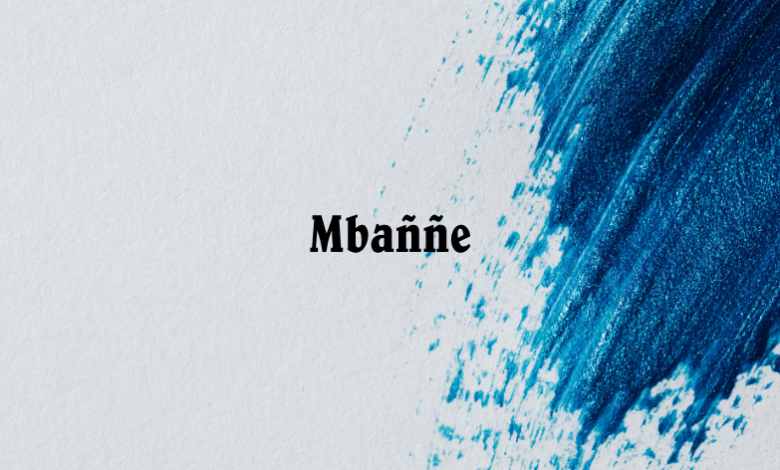Mbaññe: Embracing a Path to Personal

Have you ever wondered about the deeper connections that bind us all together? Enter mbaññe, a concept that, although possibly unfamiliar to many, holds a significant place in fostering personal and communal harmony. This article dives into the essence of mbaññe, exploring its origins, impact, and practical applications in today’s world.
The Origin of mbaññe
Mbaññe is more than just a word; it’s a cultural treasure trove with a rich history. Originating from indigenous communities, it encapsulates a worldview centered on interconnectedness and mutual support. Historically, mbaññe was integral to community life, guiding interactions and decision-making processes. Over time, its principles have evolved, but the core values remain intact, highlighting its timeless relevance.
Understanding mbaññe
At its heart, mbaññe represents a philosophy of life that emphasizes empathy, respect, and collaboration. Unlike similar concepts that might focus solely on individual well-being, mbaññe balances personal and collective growth. Key characteristics include a strong sense of belonging, shared responsibility, and the pursuit of common goals.
The Role of mbaññe in Modern Society
In today’s fast-paced world, mbaññe offers a refreshing perspective. Its influence can be seen in community-driven initiatives, workplace cultures that prioritize teamwork, and even in family dynamics. By integrating mbaññe into contemporary culture, we create environments that nurture positive relationships and collective success. Examples range from community gardens to corporate social responsibility programs, all embodying the spirit of mbaññe.
Benefits of Embracing mbaññe
Adopting mbaññe can lead to significant personal and communal benefits. On a personal level, it promotes self-awareness, emotional intelligence, and resilience. For communities, it fosters unity, trust, and cooperation, enhancing social bonds. Additionally, the psychological well-being associated with feeling part of a supportive network can reduce stress and improve overall mental health.
Challenges and Misconceptions
Despite its benefits, mbaññe is often misunderstood. Some perceive it as overly idealistic or impractical in modern settings. However, real-life stories and experiences demonstrate that with the right mindset, these challenges can be overcome. Overcoming misconceptions involves educating others and showcasing the tangible benefits of living by mbaññe principles.
Implementing mbaññe in Everyday Life
Incorporating mbaññe into daily routines doesn’t require drastic changes. Simple practices like active listening, showing appreciation, and participating in community activities can make a difference. Success stories from individuals who have embraced mbaññe highlight its practical applicability and the positive outcomes of such a lifestyle. Balancing mbaññe with other life aspects ensures a holistic approach to well-being.
The Global Perspective on mbaññe
Different cultures interpret mbaññe uniquely, yet the underlying principles remain universal. By comparing these perspectives, we can learn valuable lessons and appreciate the global applicability of mbaññe. From African Ubuntu philosophy to the Hawaiian concept of Aloha, the essence of mbaññe resonates worldwide, emphasizing humanity’s shared values.
Mbaññe and Technology
The digital age offers new avenues for promoting mbaññe. Technology can bridge gaps, fostering connections and supporting collaborative efforts. Tools and apps designed to enhance communication, organize community events, and facilitate resource sharing are perfect examples. Looking ahead, technology will continue to play a crucial role in spreading and sustaining mbaññe.
Case Studies and Real-Life Examples
Stories of individuals and communities practicing mbaññe are both inspiring and instructive. Whether it’s a neighborhood coming together to support a local cause or a company creating an inclusive workplace, these examples illustrate mbaññe’s practical impact. Personal anecdotes and community initiatives serve as powerful reminders of the potential within each of us to contribute positively to society.
The Future of mbaññe
As we look to the future, mbaññe holds great promise. Predictions suggest an increasing embrace of its principles, especially as people seek more meaningful connections in an increasingly digital world. However, challenges such as cultural shifts and economic pressures may arise. Recognizing and addressing these will be key to ensuring mbaññe’s continued relevance and growth.
How to Educate Others About mbaññe
Educating others about mbaññe involves clear communication and the use of engaging resources. Teaching methods can include workshops, storytelling, and the use of multimedia. Resources such as books, documentaries, and online platforms can aid in spreading awareness. Engaging the younger generation is particularly important, as they will carry the torch forward.
Mbaññe in Art and Literature
Art and literature offer rich mediums for expressing and exploring mbaññe. From traditional folk tales to contemporary works, mbaññe has inspired countless creative expressions. Notable pieces include poems, paintings, and stories that capture its essence. These artistic interpretations not only preserve mbaññe’s legacy but also make it accessible to a broader audience.
Debunking Myths About mbaññe
Addressing myths and misconceptions about mbaññe is crucial for its acceptance and practice. Common false beliefs, such as viewing it as outdated or irrelevant, can be countered with evidence-based clarifications and expert opinions. Highlighting successful implementations and tangible benefits helps to debunk these myths effectively.
Conclusion
Mbaññe, with its emphasis on empathy, collaboration, and shared growth, offers a powerful framework for personal and communal well-being. By understanding its origins, appreciating its benefits, and learning how to implement it in our lives, we can foster stronger, more connected communities. Embrace mbaññe and be part of a movement that values and nurtures our collective humanity.
FAQs
What is the basic concept of mbaññe? Mbaññe is a philosophy that emphasizes empathy, respect, and collaboration, focusing on both individual and collective well-being.
How can I incorporate mbaññe into my daily life? You can practice mbaññe by engaging in active listening, showing appreciation, participating in community activities, and fostering supportive relationships.
Are there any downsides to mbaññe? While generally positive, some may view mbaññe as idealistic. Balancing its principles with practicality is key to overcoming this perception.
How is mbaññe perceived in different cultures? Various cultures have unique interpretations of mbaññe, but the core principles of empathy and collaboration are universal. Examples include African Ubuntu and Hawaiian Aloha.
What resources are available to learn more about mbaññe? Books, documentaries, online platforms, and community workshops are great resources for learning about mbaññe and its applications.

